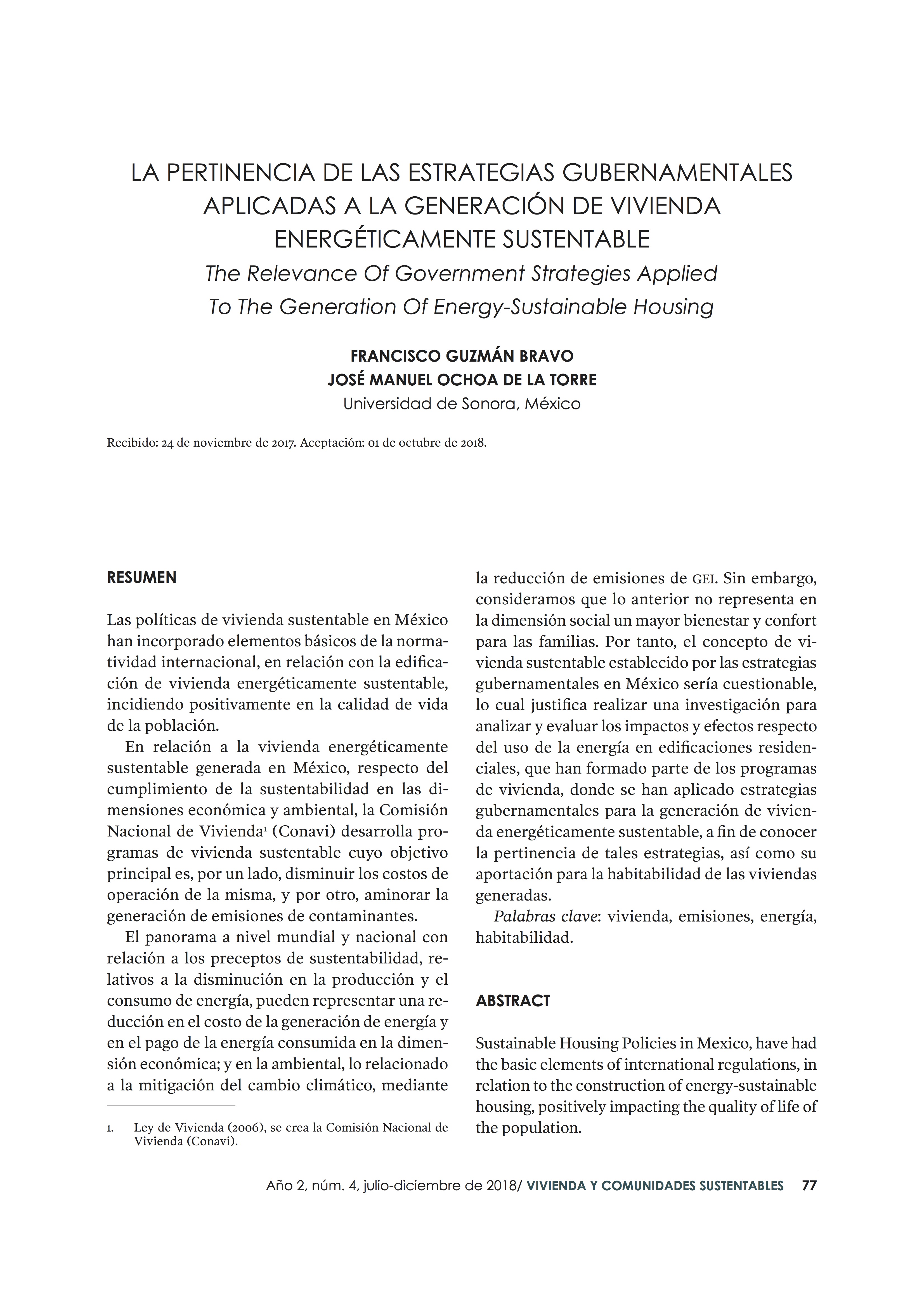The Relevance Of Government Strategies Applied To The Generation Of Energy-Sustainable Housing
DOI:
https://doi.org/10.32870/rvcs.v0i4.42Keywords:
housing, emissions, energy, habitabilityAbstract
Sustainable Housing Policies in Mexico, have had the basic elements of international regulations, in relation to the construction of energy-sustainable housing, positively impacting the quality of life of the population. In relation to the energy-sustainable housing generated in Mexico, regarding compliance with sustainability in the economy and environmental dimensions, the National Housing Commission (CONAVI), develops sustainable housing programs whose main objective is, on the one hand, to reduce costs of operation of the same and on the other the generation of pollutant emissions. The global and national scenario in relation to the sustainability precepts, related to the decrease in the production and consumption of energy, can represent a reduction in the cost of generating energy and in the payment of the energy consumed in the economic dimension, and in the environmental aspect related to the mitigation of climate change, through the reduction of GHG emissions. Nevertheless; we consider that the above does not represent greater welfare and comfort for families in the social dimension, therefore the concept of sustainable housing established by government strategies in Mexico would be questionable, which justi es conducting research, to analyze and evaluate the impacts and effects, regarding the use of energy in residential buildings, which have been part of the housing programs, where government strategies have been applied for the generation of energy-sustainable housing, in order to know the relevance of such strategies, as well as their contribution for the habitability of the homes generated.Metrics
References
Autodesk, I. (20 de 05 de 2016). Programa Autocad. Obtenido de Autodesk: https://www.autodesk. com/education/free-software/autodesk-a360
Autodesk, Inc. (19 de 05 de 2016). Programa Revit. Obtenido de Autodesk: https://www.autodesk. com/education/free-software/autodesk-a360
Cervantes Borja, J. F. (Marzo de 2015). "Caracteristicas de habitabilidad física de la vivienda de interés social". Anuario de Investigación del Posgrado de Urbanismo, 2(1), 59-77.
Comisión Nacional de Vivienda. (18 de noviembre de 2007). Código de Edificación de Vivienda. Recuperado el 17 de junio de 2014, de CMIC.ORG: http://www.cmic.org /comisiones/sectoriales/ vivienda/biblioteca/archivos/cev%20PDF.pdf
Comisión Nacional de Vivienda (2010). Codigo de Edificación de Vivienda, Segunda Edición. Recuperado el 17 de junio de 2014, de www.gob.mx: https://www.gob.mx/cms/uploads/attachment/ le/85460/Codigo_de_Edificacion_de_Vivienda.pdf
Diario Oficial de la Federación (28 de agosto de 2009). Programa Especial de Cambio Climatico. Obtenido de Secretaría de Gobernación: http://dof.gob.mx/nota_detalle.php?codigo=5107404&fecha=28/08/2009
Diario Oficial de la Federación (28 de agosto de 2009). Programa Especial de Cambio Climático. Obtenido de Secretaria de Gobernación: http://dof.gob.mx/nota_detalle.php?codi- go=5107404&fecha=28/08/2009
Diario Oficial de la Federación (30 de abril de 2014). Programa Nacional de Vivienda 2014-2018. Ob- tenido de Secretaria de Gobernacion: http:// www.dof.gob.mx/nota_detalle.php?codi- go=5342865&fecha=30/04 /2014
H. Congreso de la Unión (27 de junio de 2006). Ley de Vivienda. Diario Oficial de la Federación. Distrito Federal, México.
H. Congreso de la Unión (27 de junio de 2006). Ley de Vivienda. Diario Oficial de la Federación. Distrito Federal, México.
King, P. (2016). The principles of housing. Abington, Oxon: Integra Software Services Pvt. Ltd.
Secretaría de Desarrollo Agrario, Territorial y Urbano (octubre de 2017). Sistema Nacional de In- formación e Indicadores de Vivienda. Recuperado el 23 de Octubre de 2017, de Reporte Mensual del Sector Vivienda: http://sniiv.conavi.gob. mx/Reports/Boletines/Rep_Coyuntura.aspx
Sedatu, CONAVI y GIZ. (2015). Informe final: proyecto piloto de la nama de Vivienda sustentable, apli- cando el monitoreo GEI. México, D. F.: UNAM-ISS.
Ventana Systems, Inc. (09 de junio de 2017). Vensim. Obtenido de Download Vensim® Software: http://vensim.com/download/

Downloads
Published
How to Cite
Issue
Section
License
Copyright (c) 2018 Vivienda y Comunidades Sustentables

This work is licensed under a Creative Commons Attribution-NonCommercial-NoDerivatives 4.0 International License.
The authors who publish in this journal accept the following conditions:
In accordance with the copyright legislation, Sustainable Housing and Communities recognizes and respects the moral right of the authors, as well as the ownership of the patrimonial right, which will be transferred to the University of Guadalajara for its dissemination in open access. Sustainable Housing and Communities does not charge authors for submitting and processing articles for publication. Authors may make other independent and additional contractual agreements for the non-exclusive distribution of the version of the article published in Sustainable Housing and Communities (for example, include it in an institutional repository or publish it in a book) as long as they clearly indicate that the work is published for the first time in Sustainable Housing and Communities.





